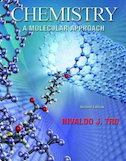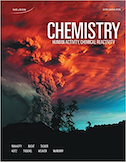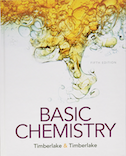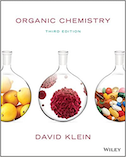

| Title | Author | Call# | Book Cover |
|---|---|---|---|
| Chemistry: A Molecular Approach | Tro, Nivaldo J. | QD 453.3 .T759 2014 |  |
| Chemistry: Human Activity, Chemical Reactivity | Mahaffy, Peter | QD 31.3 .C436 2015 |  |
| Basic Chemistry | Timberlake, Karen C. | QD 31.3 .T54 2014 |  |
| Organic Chemistry | Klein, David R. | QD 256 .K54 2016 |  |
* Want to reserve one of these titles? Email library@alexandercollege.ca with your student # and the book title.
These e-Books are available in the online library collection. Click the title to access the resource.
Everything You Need to Know About Math for General Chemistry
Williams, Joseph E. 2012
Bensaude-Vincent, Bernadette 2012
Chemistry: A Very Short Introduction
Atkins, P. W. 2014
These handbooks provide easy to digest information about topics covered within Chemistry.
The Organic Chem Lab Survival Manual: A Student’s Guide to Techniques (2011) by James W. Zubrick
The Organic Chem Lab Survival Manual provides students with information on how to conduct labs, and other skills essential to success in chemistry. It can be found in the Library, under the call number QD 261 Z83 2011.
Encyclopedia of Chemistry Research (2012) by Andrew P. Albertis
The Encyclopedia of Chemistry Research provides information on current research in the field of chemistry, for a wide variety of topics.
When looking for resources related to CHEM, try some of these keywords in your searching :
e.g., combustion AND matter
* Interested in learning more about using keywords for research? Check out our videos on how to create and search using keywords on our Research Skills page.
Open access resources are resources that are available to everyone for free online. Links here will lead to sites where you can download textbooks or access journals related to chemistry.
Chemistry is a textbook for students about the core concepts of chemistry. It discusses how chemistry concepts apply to students lives and the world around them.
Introductory Chemistry by Jessie A. Key
Introductory Chemistry is a survey of the basic topics of chemistry.
Analytical Chemistry 2.0 by David Harvey
Analytical Chemistry 2.0 is a textbook about solving chemical problems. It focuses on experimental design, sampling, calibration strategies, standardization, optimization, statistics, and the validation of experimental results.
Organic Chemistry with a Biological Emphasis by Timothy Soderberg
Organic Chemistry with a Biological Emphasis is a textbook covering the core concepts of organic structure, structure determination, and reactivity.
Introduction to Inorganic Chemistry
Introduction to Inorganic Chemistry is a textbook focusing on the study of the synthesis, reactions, structures and properties of compounds of the elements.
Biochemistry Online by Henry Jakubowski
Biochemistry Online focuses on the study of the structure of biological functions/activities, binding reactions for biological events, and chemical principles, such as dynamic equilibria (mass action, and reaction kinetics and mechanisms).
Illustrated and interactive periodic table by the Royal Society of Chemistry features history, alchemy, podcasts, videos, and data trends across the periodic table.
A collection of news articles, podcasts, and webinars about the chemistry, curated by the Royal Society of Chemistry (RSC).
A free chemical database covering a huge range of molecules. Users can search by keyword, by structure, or by properties such as molecular weight, elements, and formulas.
Assignments written for chemistry courses will follow the style outlined by the assignment guideline. Style guide handbooks are available for your reference in the library or at the Writing and Learning Centre. Online WLC guides can be found here. You can also book an appointment with the Writing and Learning Center for workshops and one-on-one learning help.
Need help? Connect with a Librarian through AskAway!
AskAway ChatAlexander College acknowledges that the land on which we usually gather is the traditional, ancestral and unceded territory of the Coast Salish peoples, including the territories of the xʷməθkwəy̓əm (Musqueam), Skwxwú7mesh (Squamish), and Səl̓ílwətaʔ/Selilwitulh (Tsleil-Waututh) Nations. We are grateful to have the opportunity to work in this territory.
Alexander College acknowledges that the land on which we usually gather is the traditional, ancestral and unceded territory of the Coast Salish peoples, including the territories of the xʷməθkwəy̓əm (Musqueam), Skwxwú7mesh (Squamish), and Səl̓ílwətaʔ/Selilwitulh (Tsleil-Waututh) Nations. We are grateful to have the opportunity to work in this territory.